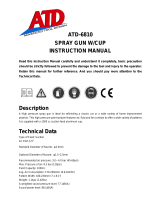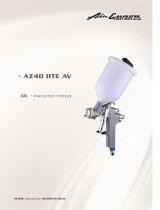Page is loading ...

- 1 -
Model No. SP-33000
Low Volume Low Pressure (LVLP) Gravity Feed Spray Gun

- 2 -
TABLE OF CONTENTS:
1. Description
2. Specification and Technical Data
3. Important Safety Instruction
4. Instructions for Operation
5. Maintenance/Storing
6. Troubleshooting/Repairs
7. Parts List
8. Warranty Information
1. Description
The SPRAYIT SP-33000 LVLP Gravity Feed Spray Gun can be used for variety of different
applications such as Automotive, Industrial, Marine and Wood Working. The LVLP features require
less air allowing you to use a smaller air compressor. Using the SPRAYIT SP-33000 reduces
overspray and allows you to spray larger surfaces without having to stop. The Low Volume Low
Pressure feature allow for more control with less overspray and waste. The Stainless Steel Fluid
Needle and Nozzle are corrosion resistant. The separate and adjustable fluid fan pattern and air
controls make for more precise fan patterns and less waste. Air consumption 3.0 to 3.9 CFM @ 30
PSI. Working pressure 28-45 PSI. Maximum pressure 60 PSI. The SPRAYIT brand has been
manufacturing quality tools since 1928.
2. Specifications and Technical Data
1. Name of Parts
2.Technical Data
Type of Feed ………………….. Gravity
Air inlet ……………………… 1/4”
Standard Dia of Nozzle: 1.5mm
Optional Dia of Nozzle: 1.3-2.5mm
Recommended air pressure: 2.0-3.5bar (28.8 – 51psi)
Max. Pressure of air: 8.3 bar (120.5psi)
Paint Capacity: 600cc
Avg. Air Consumption: 84.2 – 110.4 l/min (3.0-3.9cfm)
Pattern width 180-250mm
Weight 0.35kgs (0.77 lbs)

- 3 -
3. Important Safety Instructions
1. Toxic vapors produced by spraying certain materials can create intoxication
and serious damage to your health. Always wear safety glasses, gloves and
respirator to prevent toxic vapor hazard and solvent coming into contact with
your noise, eyes or skin. (See fig 1)
2. Never use oxygen, combustible or any other bottle gas as a power source. This
would cause explosion and serious personal injury. (See fig 2)
3. Fluid and solvent can be highly flammable or combustible.
Use in well-ventilated spray booth and avoid any ignition sources, such as
smoking, open flames and decrial hazard. (See fig 3)
4. Disconnect tool from air supply hose before doing tool maintenance and during
non-operation.
5. Use clean, dry and regulate compressed air rated at 2.0~3.5bar, never exceed
maximum permissive operating pressure (see fig 4)
6. Never use homogenate hydrocarbon solvent, which can chemically react with
aluminum and zinc parts and chemically compatible with aluminum and zinc pats.
7. Never point gun at you and others at any time.
8. Before operating the tool, make sure all the screws & caps are securely tightened
in case of leaking;
9. Before painting, inspect for free movement of the trigger and nozzle to insure tool can operate well.
10. Never modify this tool for any applications. Only use parts, nozzles and accessories recommended
and accessories recommended by manufacture. This will void warranty.
11. This equipment should only be used in a well ventilated area.
4. Instructions For Operation
Preparation
1. After unpacking the product, inspect carefully for any damage that may have occurred during transit.
Make sure to tighten fittings, bolts, etc., before putting unit into service.
2. Thoroughly mix and thin paint in accordance with the paint manufacturer’s instructions. Most
materials will spray readily if thinned properly.
3. Strain material through filter, cheese cloth or a paint strainer.
4. Fill the canister about ¾ full and start the air compressor.
WARNING DO NOT EXCEED Spray Gun or any other parts in the compressor system MAXIMUM PRESSURE.
5. After Connect the gun to air supply, please make sure that the fluid cap, container and air hose have
been connected tightly with spray gun.
6. Set up a piece of cardboard or other scrap material to use as a target and adjust for best spray
pattern.
WARNING Never aim or spray at yourself or anybody else which would cause serious injury.
7. Test the consistency of the material by making a few strokes on a cardboard target. If material still
appears too thick, add a small amount of thinner. THIN WITH CARE! Do not exceed paint
manufacturer’s thinning recommendations.
1
图表 1
2
3
4

- 4 -
Adjustment
The desired pattern, volume of fluid output and fine atomization can easily be obtained by
regulating the Pattern Adjusting Knob, Fluid Adjusting Knob and Air Adjusting Knob.
PATTERN ADJUSTMENT: Turning Pattern Adjusting Knob to the right until tight will make spray pattern
round, or turning left make spray pattern ellipse.
Material (PAINT) ADJUSTMENT: Turn the Paint Adjusting Knob clockwise will decrease
the volume of fluid output and counter-clockwise will increase fluid output.
AIR Inlet ADJUSTMENT: Turning the Air Adjusting valve clockwise will decrease the air
volume. And counter-clockwise will increase the air volume.
Operation
1. Begin spraying. Always keep the gun at right angles to the work.
2. Keep the nozzle about 6 to 12 inches from the work surface. Grip the gun keeping perpendicular
with spraying area then move it parallel for several times, stopping gun movement in mid-stroke will
cause a build up of paint and result in runs. Do not fan the gun from side to side while painting. This
will cause a build-up of paint in the center of the stroke and an insufficient coating at each end.
3. Trigger the gun properly. Start the gun moving at the beginning of the stroke BEFORE SQUEEZING
THE TRIGGER and release the trigger BEFORE STOPPING GUN MOVEMENT at the end of the
stroke. This procedure will blend each stroke with the next without showing overlap or unevenness.
4. The amount of paint being applied can be varied by the speed of the stroke, distance from the surface
and adjustment of the fluid control knob.
5. Overlap strokes just enough to obtain an even coat.
NOTE: Two thin coats of paint will yield better results and have less chance of runs than one heavy layer.
6. Use a piece of cardboard as a shield to catch overspray at the edges of the work to protect other
surfaces.
5. Maintenance
Incomplete cleaning could cause function failures and a degradation of the fan form.
1. Remove any remaining paint by pouring it into another container.
2. Disassemble the spray gun making sure to remove the needle before disassembling the nozzle to
avoid damage to the housing of the nozzle closure.
3. Clean all the paint passages and the nozzle. Clean the other components using a brush soaked in
solvent.
4. Reassemble the spray gun and spray a small quantity of solvent to eliminate all the residues in the
paint passages.

- 5 -
WARNING:
NEVER USE METAL OR OTHER OBJECTS THAT COULD DAMAGE THE HOLES IN THE NOZZLE AND CAP. NEVER
IMMERSE THE SPRAY GUN COMPLETELY IN SOLVENT. NEVER USE COMPONENTS OR PARTS THAT ARE NOT
MANUFACTURER ORIGINALS.
Storing
When not using spray gun, turn the fluid adjustment knob counter-clockwise to open
which will reduce spring tension on needle fluid tip.
Spray gun MUST BE well cleaned and lightly lubricated.

- 6 -
6. Trouble Shooting
Symptom
Problems
Solution
Fluttering or
spitting
1. Material level too low.
2. Container tipped too far.
3. Loose fluid inlet connection.
4. Loose or damaged fluid tip/seat.
5. Dry or loose fluid needle packing
nut.
6. Air vent clogged
1. Add material into container.
2. Hold more upright.
3. Tighten.
4. Adjust or replace.
5. Lubricate and or tighten.
6. Clear vent hole.
Pattern is arc.
1. Worn or loose Fluid nozzle.
2. Material builds up on Air cap.
1. Tighten or replace Fluid nozzle.
2. Remove obstructions from holes,
But don’t use metal objects to clean it.
Pattern is not
Evenly spread.
1. Material builds up on Air cap.
2. Fluid nozzle dirty or worn.
1. Clean or replace Air cap.
2. Clean or replace Fluid nozzle.
The center of Pattern
too narrow.
1. Material too thin or not enough.
2. Atomization air pressure too
high.
1. Regulate material viscosity.
2. Reduce air pressure.
Pattern width of
fan-sharp is not
enough.
1. Material too thick.
2. Atomization air pressure too low.
1. Regulate material viscosity.
2. Increase air pressure.
Air leaking from
air cap without
pulling trigger
1. Sticking air valve stem
2. Contaminate on air valve or seat
3. Worn or damaged air valve or
seat
4. Broken air valve spring
5. Bent valve stem
1. Lubricate
2. Clean
3. Replace
4. Replace
5. Replace
Fluid leaking from
packing nut
1. Packing nut loose
2. Packing worn or dry
1. Tighten, but do not restrict needle
2. Replace or lubricate (non-silicone oil)
Excessive
overspray
1. Too high atomization pressure
2. Too far from work surface
3. Improper stroking (arcing, gun
motion too fast)
1. Reduce pressure
2. Adjust to proper distance
3. Move at moderate pace, parallel to
surface.
Will not spray
1. No pressure at gun
2. Fluid control not open enough
3. Fluid too heavy
1. Check air lines
2. Open fluid control
3. Thin fluid or change to pressure feed
system.

- 7 -
7. Parts List
Note: If you need parts of this model, contact us or the distributor where you bought this product.
No
Description
No
Description
No
Description
1
Air Adj. Screw
16
Switch pole
31
Ventilator Head
2
Air Adj. Knob
17
O-ring (8.5*1.2)
32
Snap Retainer
3
O-ring 3.3X1.5
18
O-ring (10.7*1.8)
33
Trigger
4
Flat washer
19
Needle Housing
34
Trigger Lever
5
Air valve spring
20
Cover Washer
35
Atomization
6
Air Valve step
21
O-ring(4.5*1.2)
36
Fluid washer
7
Air Inlet Joint
22
Needle Housing screw
37
Round nut
8
Gun body
23
Foam Washer
38
Washer
9
Flat washer
24
Air Inlet Valve pole
39
Nozzle
10
O-ring (4.5*1.8)
25
Switch spring
40
Inner circle
11
O-ring (8.7*1.85)
26
Atomization needle
41
Nozzle foam washer
12
Fluid Adj. Knob
27
Paint Inlet Joint
42
Seal washer
13
Fluid Adj. Needle
28
Filter
43
Direction screw
14
Fluid Needle Spring
29
Container
44
Snap Retainer
15
Fluid Adj. screw
30
Container cover

- 8 -
8. Warranty
Disclaimers and Limitations of Remedies
This warranty gives you specific legal right, and you may also have other rights which may vary from State to
State.
Disclaimer of other Warranties
To the fullest extent permitted by applicable law, this limited warranty is exclusive and expressly in lieu of any
and all other warranties, including, without limitation, any implied warranties of merchantability or fitness for a
particular purpose or any other implied warranties that may arise from the course of dealing or usage of the
trade. California Air Tools Inc. hereby declaims and excludes all other warranties.
To the extent that California Air Tools Inc. products are consumer products under applicable federal and state
law with respect to any customer, the duration of any implied warranties (including, but not limited to implied
warranties of merchantability or fitness for a particular purpose) are limited to the shortest duration permitted
by applicable law or the Limited Warranty period provided herein, whichever is longer.
Limitations of Remedies
California Air Tools Inc. shall not be liable to customer, or anyone claiming under customer, for any other
obligations or liabilities, including, but not limited to, obligations or liabilities airing out of breach of contract or
warranty, negligence or other tort or any theory of strict liability, with respect to the spray gun or California Air
Tools Inc. acts or omissions or otherwise. To the fullest extent permitted by applicable law California Air Tools
Inc. shall not in any event be liable for incidental, compensatory, punitive, consequential, indirect, special or
other damages, including but not limited to loss of use, loss of income, loss of time, loss of sales, injury to
personal property, or liability customer incurs with respect to any other person, or any other type or form of
consequential damage or economic loss.
/








